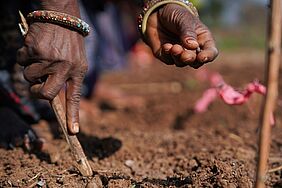These results were presented by the Research Institute of Organic Agriculture (FiBL), University of Ghana, Kenya Agricultural & Livestock Research Organization (KALRO), and Biovision Africa Trust during a side event for the Science Days of the UN Food System Summit. The presenters showed that organic agriculture could equal other production systems regarding profitability and productivity and provide more benefits addressing several SDGs (goals 1, 2, 3, 6, 8, 12, 13, and 15). In conclusion, empirical findings showed that:
- Productivity of organic agriculture can achieve similar yields; yield gaps depend on crop, site, and farmer know-how
- Profitability of organic agriculture is very context-specific and varies between crops
- Sustainability of organic agriculture is better, e.g., with regards to species diversity, land degradation, greenhouse gases, energy use, waste reduction & disposal
However, the good performance of organic agriculture systems depends on active, locally adapted, organic management that respects the principles of organic farming. Good practice management includes preventive pest and disease management like crop rotations, mixed cropping systems, and soil fertility management. The substitution of conventional inputs by organic inputs is not enough to achieve good production and economic results. The complexity of a system determines its performance. Within the same line is the finding that a pure focus on cash crops does not favor good management among farmers.
Capacity building & scaling up is key
The forum participants conclude that limited capacities, lack of appropriate inputs, and market access are major agronomic and institutional challenges that should be addressed to exploit the potential of organic agriculture in smallholder contexts fully:
- Research and capacity building need to be strengthened at the farm, extension, and research level to close knowledge gaps, e.g., on pests and diseases, nutrient dynamics, soil fertility, management of different crops, and appropriate mechanization to reduce labor demand.
- Governance at the supply chain and cooperative level is essential to organize farmers better, provide technical support, train supply chain actors, enhance access to information and inputs, and catalyze successful linkage to markets.
- Market interventions should be sensitive to the fact that crops for export might replace crops important for food security (e.g., macadamia nuts replace corn) with negative consequences for the food security of small producers.
- Multi-objective sustainability assessment tools encompassing all dimensions of sustainability already exist and should be used in determining returns to investments.
- Policy interventions in terms of plans, programs, and investments supporting truly sustainable food systems as organic agriculture do not need prolonged debate. Instead, they need significant support over a long enough period.
Further information
Contact
Links
- systems-comparison.fibl.org: Project "Farming Systems Comparison in the Tropics" (SysCom)
- proecoafrica.net: Project "ProEcoAfrica"
- systems-comparison.fibl.org: Event recording of the side event for the Science Days of the UN Food System Summit
Download
- systems-comparison.fibl.org: Event presentation of the side event for the Science Days of the UN Food System Summit




